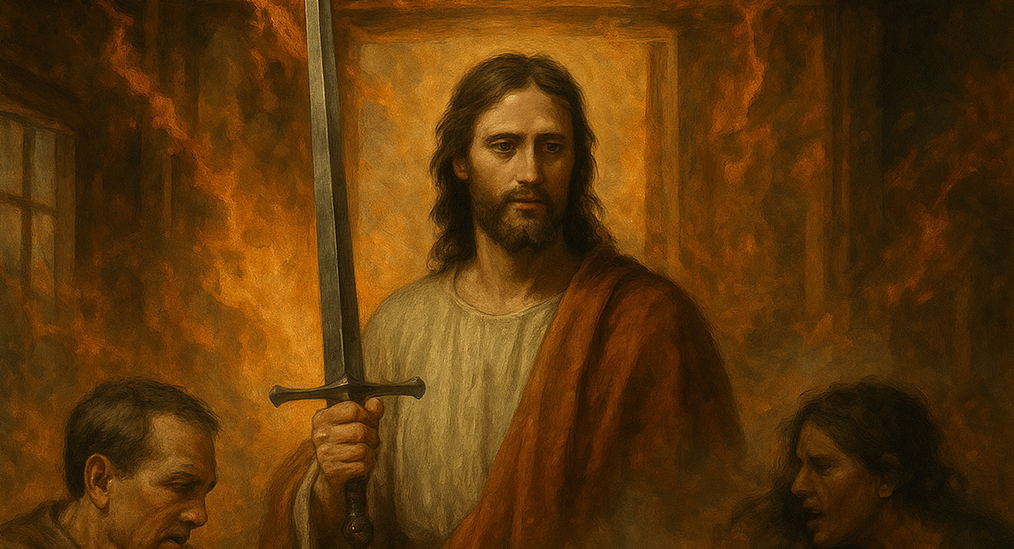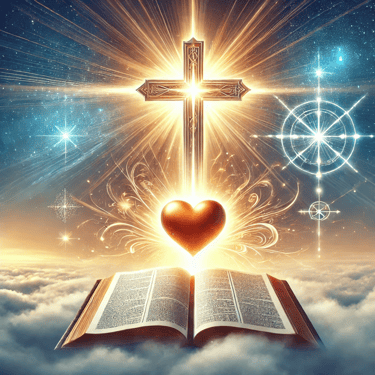Not Peace, But War
Matthew 10:34, Do not think that I came to bring peace to the earth; I did not come to bring peace, but a sword.”
Alan Dyer
8/3/20253 min read


Not Peace, But War
Gospel of Thomas, Saying 16
Jesus said, “Maybe people think that I’ve come to cast peace on the world, and they don’t know that I’ve come to cast divisions on the earth: fire, sword, and war. Where there are five in a house, they’ll be three against two and two against three, father against son and son against father. They’ll stand up and be one.”
Introduction: The Disruptive Christ
We often think of Jesus as the Prince of Peace. We imagine open arms, gentle words, and the calming of storms. And yes, there is truth in that image. But it is not the whole truth.
In this lesser-known gospel, Jesus offers something jarring not peace, but fire. Not harmony, but sword. Not comfort, but war.
This saying is echoed in Matthew 10:34, Do not think that I came to bring peace to the earth; I did not come to bring peace, but a sword” and in Luke 12:51–53, where Jesus describes households torn apart. But here in Thomas, the image sharpens. The household becomes a battlefield, and yet... through the clash, something holy emerges.
This is not about promoting violence, but about unveiling a deeper spiritual law:
Truth disrupts. Awakening divides. But in the breaking, we are made whole.
Parable: The House of Five
There was a house shaped like a question. It had five shadows living inside, father, son, brother, mother, and one who never said what they were. They had dwelt there in silence, sharing bread and names, until the Fire began to whisper.
One morning, the son spoke a riddle the others couldn’t bear: “Peace is the sleep of forgetting. I would rather wake in flames.”
The father struck the table. The brother fled to the roof. The mother wept salt into the stew. The fifth one simply watched.
By dusk, there were three against two, two against three. The names they had shared began to burn. They accused. They embraced. They vanished and reappeared in different corners of the house, until the structure itself cracked.
Then came the night with no ceiling, and the fifth stood in the firelight, unafraid. From within the ashes of names, a voice said, “Now that the sword has passed between you, stand.”
And the shadows stood. Each alone. Each now one.
Explanation: The Fire, the Sword, the War
Jesus challenges the easy assumption that his message would be universally welcomed or instantly unifying. He warns us that truth isn’t always gentle. It disrupts. It divides. But it does so for the sake of something greater.
Fire
Fire purifies. It burns away illusion. It represents the intensity of spiritual awakening, an inner combustion that melts our masks and reveals our essence.
Sword
The sword cuts. It divides false from real, shadow from substance. It is the edge of discernment that slices through pretense, leaving only what is true.
War
War here is not the violence of nations, but the holy conflict of the soul, the interior struggle between ego and spirit, between inherited identity and divine calling.
The Household as Microcosm
The image of five people splitting, three against two, two against three, is not merely about family arguments. It’s a spiritual metaphor:
The household represents the world we inhabit, our traditions, roles, and relationships.
The division is what happens when someone dares to wake up in a house still asleep.
The tension arises when truth enters a space built on quiet denial.
We’ve all felt this. The moment we choose honesty over approval, courage over comfort, soul over system, division follows.
But it is not the end.
“They’ll stand up and be one”, The Paradox of Unity
This final line is not a contradiction. It’s a revelation.
The goal is not peace through sameness, but unity through transformation.
To “stand up” is the language of resurrection, to rise after being undone. To “be one” is not about blending into the old order but emerging as something entirely new.
The ones who “stand” are those who’ve passed through the sword, the fire, the conflict, and come out luminous, whole, and free.
Mystical Reading
The soul must rupture from its inherited stories to discover its divine origin.
True unity is found not in avoiding conflict, but in transcending the structures that bind.
The “solitary ones”, those who stand alone in the firelight, are not abandoned, but awakened.
Meditation
What “peace” have I clung to that may actually be a form of sleep?
Where in my life has truth caused conflict, and was it worth it?
Who am I when the names, roles, and relationships burn away?
Am I willing to walk through the fire to discover what stands on the other side?
Closing Prayer
Father in Heaven,
Tear through the silence of my settled house.
Divide what must be divided.
Burn away the illusions I mistake for peace.
When the sword has passed through me,
Let me rise, whole, awake, and unafraid.
Let me stand in the light,
Not to conquer, but to become.
Amen.
© SDBEST LLC, 2025. All rights reserved.
alan@wambology.org
